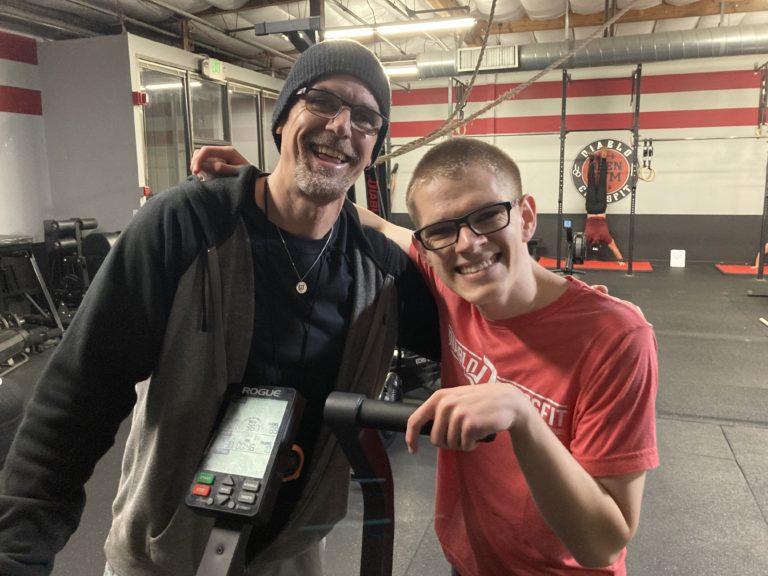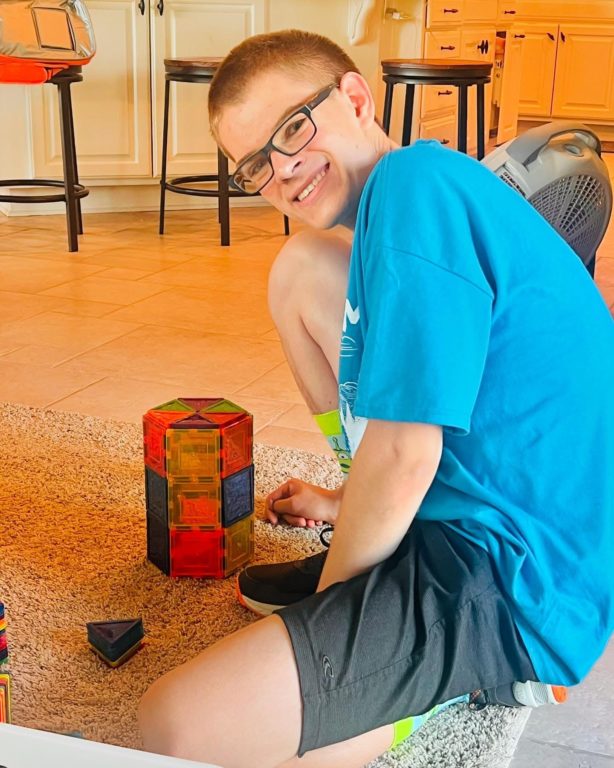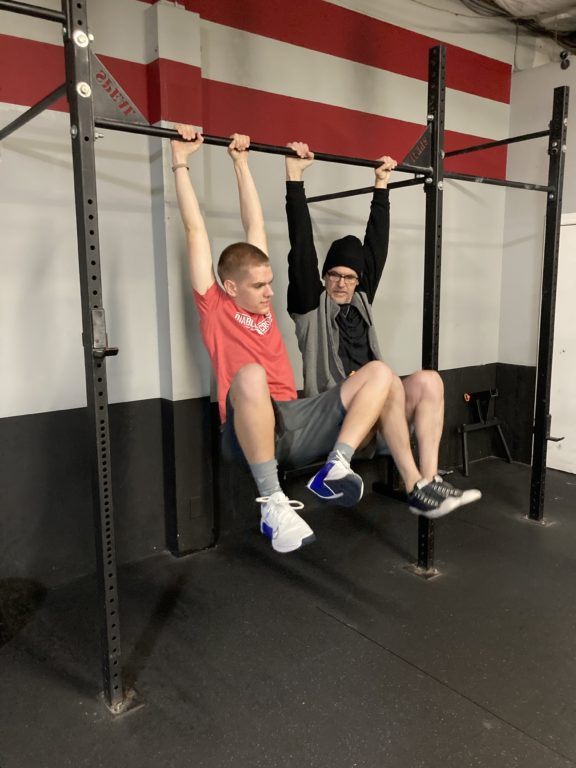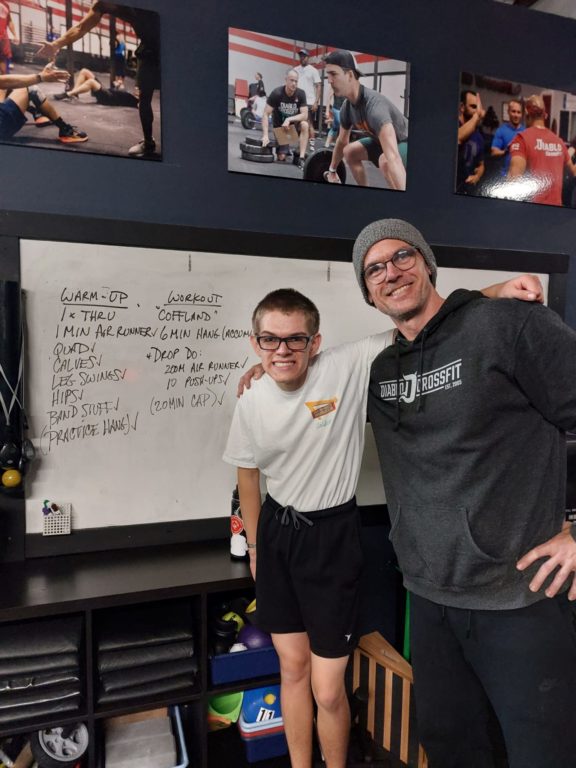Chad Svoboda stepped outside his front door into the warm California air when he spotted a group of students and a few aides from the disability program at the local adult education center walking to the Safeway grocery store for a snack.
He noticed a familiar face in the group — Spencer Michaelsen, the son of Matt and Hannah Michaelsen, who he coached at Diablo CrossFit.
That got Svoboda thinking. He knew that in high school, P.E. was most likely the only class Spencer would be integrated into the general class. But once he left the public education system and enrolled at an adult center, he was no longer integrated.
“They don’t have the opportunity to interact with people who aren’t like them,” he thought.
After eight years of coaching at Diablo CrossFit, Svoboda knew there was one place Spencer could be physically active and integrated into a community. So, he approached Matt and Hannah with an idea: he wanted to personally train their son at Diablo.
This was the first time in 22 years Spencer was offered an outlet free of all barriers.

Chad Svoboda and Spencer Michaelsen | Photo courtesy of Matt Michalesen
Battling Barriers
Spencer was diagnosed with autism at 2 years old. This neurodevelopment disorder impacts how a person perceives and socializes with others, and can also include limited and repetitive patterns in behavior. This can sometimes pair with an intellectual disorder.
Spencer likes structure and is very routine-driven, so he spends a lot of time in his room building everything from Lego sets to marble mazes.
“He is overall just a pretty sedentary kid,” Hannah said. “The things he enjoys doing at home require sitting for very long periods of time.”

Photo courtesy of Hannah Michaelsen on Facebook
Like Spencer, many adults with disabilities live sedentary lives.
According to a systematic review, “Adults with intellectual disabilities are a particularly vulnerable and, from a health perspective, neglected group in society, experiencing considerable health inequalities relative to the general population (Krahn & Fox, 2014). Studies have shown that adults with intellectual disabilities have low levels of physical activity (Finlayson et al., 2009) and poor nutritional habits (Humphries et al., 2009), leading to a high prevalence of obesity and diabetes (Balogh et al., 2015).”
Another systematic review concluded that one reason for the sedentary lifestyle is the barriers to participation in physical activity. These barriers can include a lack of adapted spaces and physical activity, a lack of inclusion, and stigmas surrounding disabilities.
Spencer’s parents were adamant about adding physical activity to Spencer’s routine throughout his life, as it significantly improved his attention span in school and decreased his anxiety. They embedded movement into his educational plan, making him go on a run before school and ensuring he would have the opportunity to take movement breaks if he struggled in class. They even sent a pogo stick to school with him.
However, like many individuals with an intellectual disorder, Spencer ran into barriers when trying to participate in sports.
Spencer tried special needs soccer when he was a child, but was more interested in shooting hoops alone with the soccer ball than interacting with the other children. He then turned to swim lessons, which he enjoyed but took away his social interaction with others.
Then he started walking with his family and running with his dad on occasion. The rest of the time, he was sedentary, which caused him to gain weight.
Breaking Barriers
Spencer first started CrossFit with Svoboda in January 2022. The sessions were one hour long, and his mother sat in on the first few until he warmed up to the new environment.
“When something is new, there can be some resistance to it,” Hannah said. “But once it becomes part of his routine, then he is on board with it.”

Photo courtesy of Matt Michalesen
For the next few weeks, Svoboda worked with Spencer to ensure the training sessions were tailored not only to his abilities but also to his learning style.
“There was a little learning curve on my end,” Svoboda said. “I was learning what really works with him. He loves structure.”
The sessions were shortened to 30 minutes twice a week because of Spencer’s attention span. Svoboda also noticed that Spencer likes to see what is being done throughout his training session, so he would make sure to write out everything on a whiteboard so Spencer had the opportunity to check tasks off throughout.
Svoboda’s biggest responsibility was ensuring the movements were safe, as Spencer wouldn’t necessarily have the ability to communicate when he was tired. If he were fatigued or sore, Spencer would say, “Arms are crying,” or nothing at all, so it was up to Svoboda to know when to push him or give him rest.
Using a mix of his own programming and Diablo’s Workout of the Day, he would scale each movement to ensure a safe and effective workout.
For deadlifts, as an example, Svoboda would have Spencer use a Hex bar to avoid a rounded back and to keep his midline neutral. He also took out front squats, squat cleans, and squat snatches with a barbell because of the stability issues overhead. Instead, he unloaded the bar and had Spencer do the power version.
Every other movement was learned gradually, starting with the basics before adding weight and intensity.
Transformed
In February 2022, Spencer was leading the prayer at the dinner table when, to the surprise of his family, he said, “I’m thankful for Chad.”
That is the moment the Michaelsens knew he was hooked.
Within six months, Spencer had lost 20 pounds and had moved his cholesterol levels into a healthy range.
He can now throw a 20-lb med ball to a 10-foot target and do unassisted pull-ups. He has a 205-lb deadlift and a 145-lb back squat. In 2023, Spencer participated in the Adaptive CrossFit Open and ranked 49th worldwide and eighth in North America in the Men’s Intellectual division.

Spencer Michaelsen with Chad Svoboda
At home, Spencer wants to leave his room more, excited to see his friends at the gym. He is more physically capable and can now help with yard work and carry in the groceries.
Most importantly, CrossFit has provided Spencer with a community of supporters. Some members at Diablo have handshakes with him, and the entire gym will cheer for him as he finishes his workout. When he hits a PR, he will walk over and ring the bell just like every member does, and smile as the gym cheers.
Spencer no longer requires supervision during his sessions, so Matt and Spencer drive to the gym together. Matt will attend the 4:30 p.m. class while Spencer sits and reads quietly until 5 p.m. when his session starts with Svoboda. Then the two rejoin after class and head home.
“As a parent (with a kid with special needs), we are constantly on guard. You don’t get a break … . It’s like having a 4-year-old for the rest of your life. That can be really hard as a caregiver to not be able to let your guard down even for five minutes, especially when you are out in the community,” Matt said. “Having a community of people who are looking out for each other makes a huge difference for us.”
It took Svoboda’s determination to share the magic of CrossFit to break down the barriers Spencer faced his entire life.
To this day, Spencer’s favorite part of CrossFit is his coach.
“I like exercising with Chad a lot,” he said.
Breaking Barriers: CrossFit and Autism